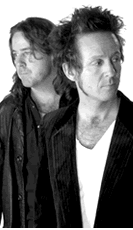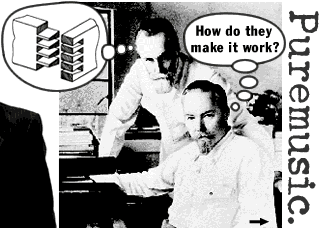 |
 |
A CONVERSATION WITH THE CASH BROTHERS (cont.)
PM: Although it's a beautiful irony that you've come together musically so recently, history bears out how difficult many brothers find working together to be. How do your personalities differ -- although I can feel that immediately --and how do you make that work?
PC: How could you feel this immediately? [Andrew starts laughing.] We just got here.
PM: Well, Peter's the quieter one, and Andrew's the more, uh, forward one.
PC: I'm just the more tired one.
PM: Well, how do you guys think your personalities differ, and how do you make that work?
AC: I think collaborations work when the personalities are different.
PC: We each have different strengths that we bring to the table, that's why it works.
AC: And, because we haven't played together since we were kids, we haven't had a chance to build up excessive baggage in that area. We've seen each other develop as songwriters, and come to this project on equal footing in that domain. We're coming together for the first time at the point where lots of brothers who worked together aren't speaking to each other anymore.
PC: We'll probably reach our fifties before we stop speaking to each other.
AC: Or maybe when we're too deaf to hear each other anyway.
PM: For instance, who's the control freak, either or both?
PC: As we started to work together, we started to figure out immediately what we had to do to make it work. Our experiences in our previous bands had been very different. I was used to doing things a certain way, which took some time to de-program.
PM: That's interesting, could we take a look at that?
PC: Well, even the way that business gets done. So we're growing into how we should be doing this together. Some adjustments have to be made.
PM: Pardon me when I pry for details, but the details of how that gets hammered out are interesting. Not only to fans and bandmates of all kinds, but to brothers and sisters.
AC: Well, we didn't just stumble into this, either. We've taken it kind of slowly, partially because we've both been in enough bands to know what a grind it can be at some points, if you don't have some solid fundamentals. Like a sound understanding of why the hell you're doing it in the first place. I think that is something that we revisit often, "Why are we doing this?" There are many real life issues that necessitate restating our commitment to each other and the project continually -- like girlfriends, staying home, money, et cetera.
PM: Let's talk about songs. The credits indicate that all the tunes on the record were written by both brothers. I take it that's just a publishing decision, right? [i.e., to co-own all the tunes regardless of who actually wrote the tune]
AC: We credit it that way, partially because we set out to make a record that sounds like one record, not two. Also, it makes things easier for us. It really helps us focus on which songs are the best songs, rather than whose getting more songs on the record, or whose will be a single, and all that stuff.
PC: We would probably do that anyway, though.
AC: That's true. We're just trying to figure out how best to do all this stuff.
PC: Sometimes the writing of the song isn't necessarily the hardest part. A lot more may be involved to get it arranged and sounding right. Say I write a song, but Andrew spends a lot more time than I did writing it tweaking it in various ways to get it to sound very special on record.
AC: Right, who's responsible for the song at that point.
PC: And hopefully, that cuts both ways. And crediting all the songs to The Cash Brothers, we're not trying to conceal who wrote what, it's just a simple way to do it.
AC: "Nebraska," for instance, was written by Peter, and "Night Shift Guru" was written by me, those two tunes in particular have received a lot of attention. Down the road, we'll probably do more cowriting than we have so far, as well.
PM: But on this record, there was little or no cowriting as such?
AC: That's right.
PM: It's amazing, then, how much this sounds like "one record." You picked the songs very carefully.
AC: Thanks, that's good to hear.
PC: And we recorded a lot of songs to pick from.
AC: And we ended up putting out another indie record in Canada, Phone Booth Tornado. We recorded most of these songs at the same time. Some got on How Was Tomorrow, some got on Phone Booth Tornado. The indie record is available at our gigs and at various websites, including ours. Perhaps down the road it will be worth Rounder Records' while to put it out.
PM: How has it been working with Rounder, are they treating you all right?
AC: Yeah, they're good people. Sometimes you might wish that they had more money for promotion, but the labels that do won't give you the same amount of care and attention, and enthusiasm. We're happy with what we've got. Our record's getting out there, it's actually getting to the people. And it's been out since April, but it seems that just about now, people are really hearing about it.
With a bigger label, the buzz is over in a couple of months. But a smaller label like Rounder will work a good record for a long time, it's a whole different curve and set of expectations. Here we are in January, and we hope to still be working this record the better part of this year. continue
print (PDF) listen to clips archives puremusic home